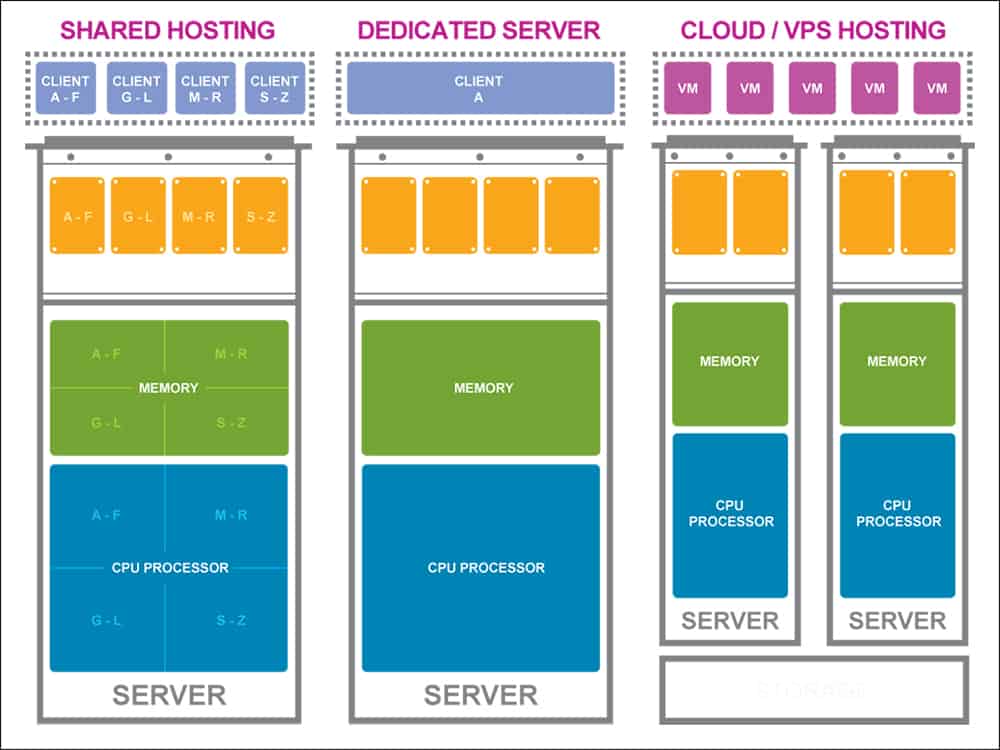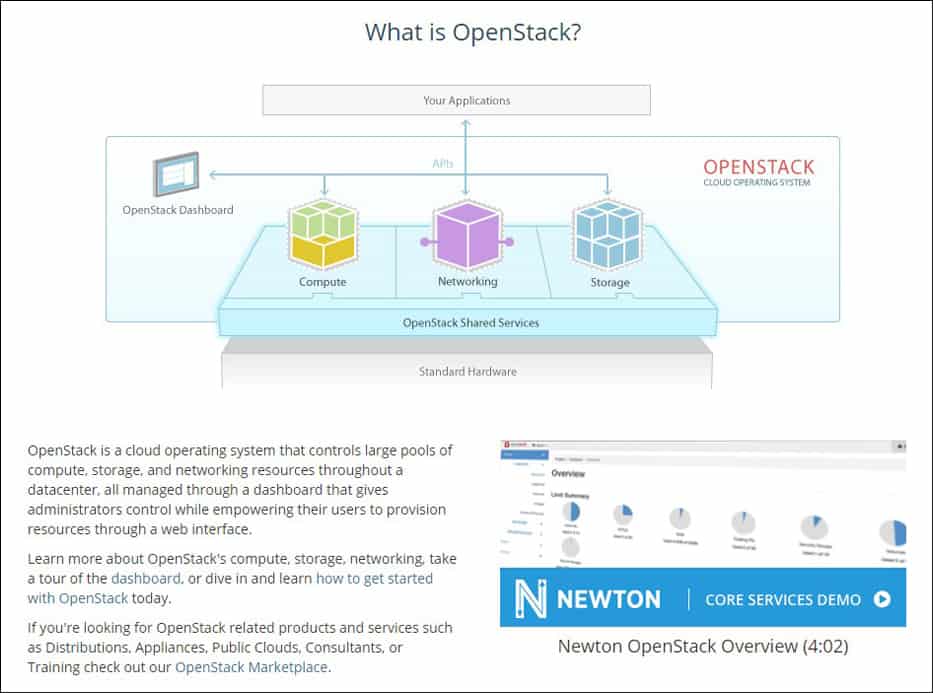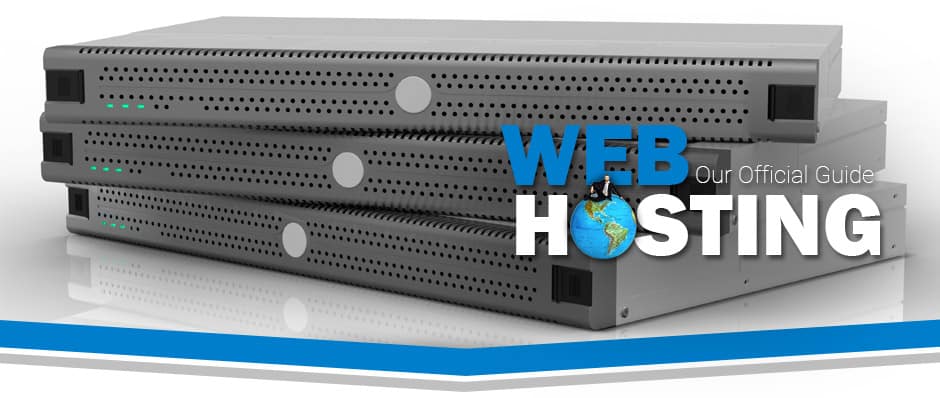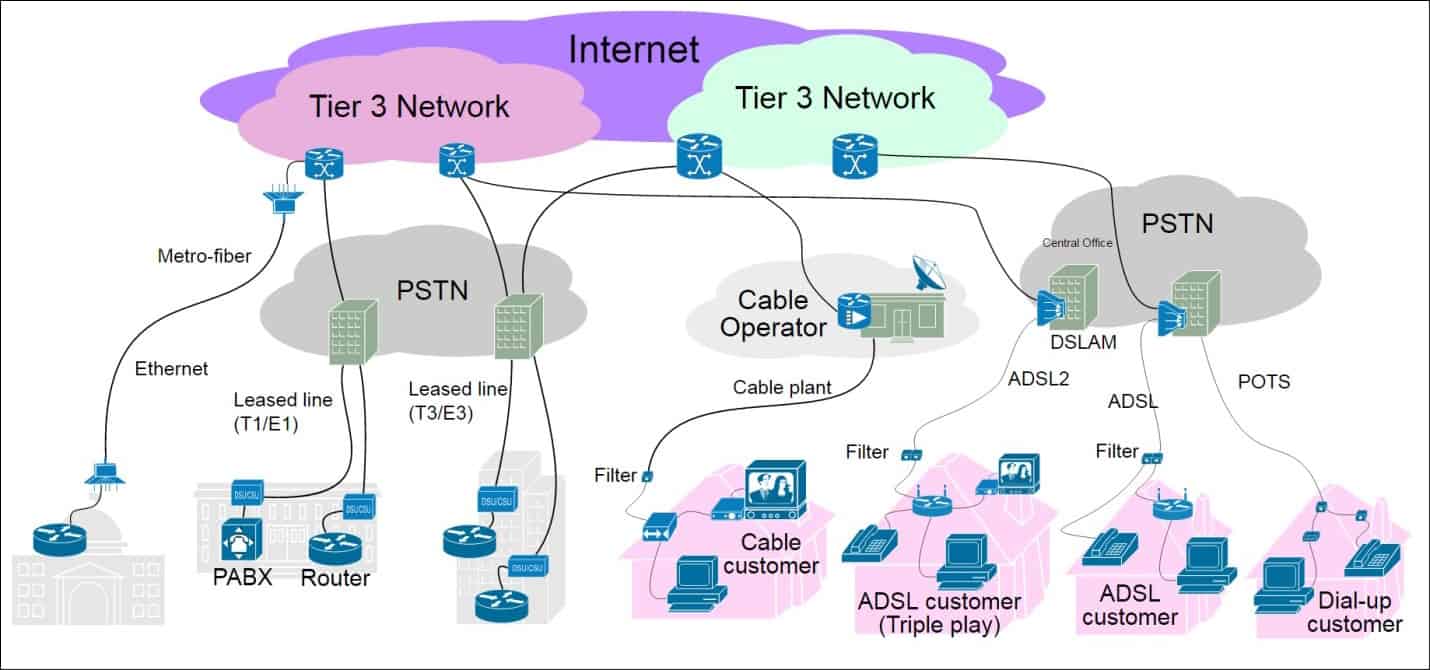Web hosting is a collection of services offered by data center companies that are required to publish website information online by serving HTML pages and embedded multimedia files to browser clients.
Web hosting operates over high-speed fiber optic connections that link local web servers to global internet service providers (ISPs).
A web server is required to store the files used in website construction and to manage databases that can be used in combination with programming languages to create online software applications with dynamic content.
Web hosting companies offer domain name registration, FTP, MySQL databases, and email accounts to customers with a collection of software tools required to manage the server hardware that is used in web development and online communication.
Web 2.0 Standards
The World Wide Web Consortium (W3C), founded by Tim Berners-Lee in 1994, governs the standards used in web development, including HTML versions, CSS, XML, and other protocols.
In the first generation of the internet, individual web pages were static, built through HTML code, and included links, images, embedded video, animation, and sound files.
In the Web 2.0 era, web development evolved to be more commonly driven by programming languages like PHP & HTML 5, through the use of Apache servers with MySQL database frameworks, and the construction of pages with JavaScript & Ajax.
Data Center Standards
The Telecommunications Industry Association has established a set of standards for data centers in the web hosting industry that rates companies into tiers according to the level of services provided.
A Tier 4 data center is of the highest quality, where the high-speed fiber optic internet “backbone” connections from international telecommunications companies link together with vast networks of rack-mount server architecture.
These data centers are used by web hosting companies to offer the shared, VPS, dedicated, and cloud hosting accounts to customers that keep web pages online 24 hours a day.
QUICK SUMMARY: A web hosting account is based on leased server hardware equipment at a data center that is used to keep a website available 24/7 to viewers with an internet connection and a web browser.
Web 2.0 sites include both static HTML content and dynamic web apps run from database frameworks.
Web Server Frameworks
Web servers are based on rack-mount hardware at a data center connected to a high-speed internet backbone connection. Web hosting accounts offer servers based on the Windows and Linux operating systems.
Windows servers are governed by a Microsoft user agreement and required by ASP.net development frameworks.
Linux servers are open source and can be based on a number of different distributions, such as Ubuntu, Debian, Red Hat, CentOS, or FreeBSD.
Both Windows and Linux servers are used in web hosting to run an Apache extension that manages the HTTP protocol for web page hosting.
Further customization of the server environment includes the use of the open source MySQL database framework, or other databases such as Oracle, Microsoft SQL Server, PostgreSQL, MariaDB, Firebird, DB2, & MongoDB.
Web servers also include support for programming languages like PHP, Perl, Python, ASP.net, and Ruby on Rails.
Domain Names, IP Addresses, & SSL Certificates
Domain names are identified across the internet by a unique numerical value called an IP address which is used to regulate traffic to the websites that are hosted on a server.
The use of top level domains (TLDs) and generic top-level domains (gTLDs) with a web hosting account is managed through an IP address using the Domain Name System (DNS).
Domain names purchased from a registrar are assigned a unique IP address by the web host, which are used to transfer files from a web server to other users internationally.
The use of SSL certificates with a domain name enables browser encryption under HTTPS protocols which can protect sensitive private information when transmitted over public data channels.
Check out our articles on how to choose a domain name and how much a domain name costs for more details!
Web Development
Web developers use the LAMP/WAMP stack to create feature-rich applications using programming languages and database storage to serve files through XHTML & DHTML.
Web scripts like content management systems (CMS), blogging platforms, ecommerce stores, forums, wikis, and social networks all run on web servers through custom stack development.
Web publishers have the option to program new websites using proprietary database frameworks, HTML authoring tools, or open source scripts based in shared development platforms.
Web development requirements are one of the most determining factors in the choice of a web hosting platform.

QUICK SUMMARY: Web hosting accounts are defined by the way server resources are allocated and shared in a data center environment. The same rack-mount hardware can be used for shared, VPS, dedicated, & cloud hosting depending on the installed software configurations.
Different Types of Web Hosting
Web hosting accounts can be subdivided into different categories based on the way that server resources are allocated and shared on the hardware that is used in a data center.
Other ways to classify web hosting depend on the way the accounts are billed or the market sector to which the services are targeted. Accordingly, the most common forms of web hosting available are:
- Free Web Hosting
- Shared Web Hosting
- Managed Web Hosting
- VPS Web Hosting
- Dedicated Web Hosting
- Cloud Web Hosting
Each type of hosting has value for a certain segment of the web development community, as well as unique advantages and disadvantages which make it most suitable for a particular domain application.
Understanding the differences between the types of web hosting available is important for site owners and businesses to make the right purchasing decision to support the development requirements of various scripts under a wide variety of user traffic conditions.
Free Web Hosting
Free web hosting is offered by various companies primarily in order to up-sell other domain services or to publish advertising on pages that are hosted under the account.
Free web hosts usually offer only subdomain support for user web pages, for example: user.geocities.com.
Many popular CMS platforms like WordPress and Joomla offer free web hosting for web publishers to get started blogging or building a website.
Free web hosting is not considered a viable solution for business owners or websites that require custom content development, ecommerce facilities, and domain name support.
Free web hosting is mostly popular with bloggers and can be viewed as another form of social networking, i.e. Tumblr, Facebook, Instagram, MySpace, Blogger, Ning, WordPress, and other brand name sites.
Shared Web Hosting
Shared web hosting provides for the management of a large number of domain names on a single server using IP addressing, where all the registered websites will simultaneously use the same CPU, RAM, hard drive, and bandwidth resources to serve files or run scripts according to temporary commands.
With shared web hosting, there may be thousands of different businesses, individuals, and organizations all serving their website files to the public from the same computer.
A single data center is able to host millions of domains on this model, allowing web hosting companies to scale at volume and offer the lowest pricing to consumers for web file management and database storage tools.
How Does Shared Web Hosting Work?
With shared web hosting, each user account is provided with a unique login to the server which is registered to a root domain name and identified through a public IP address.
Additional domain names are added to the account through the use of a control panel by administrators.
The web hosting company employs systems administrators to manage the server software installation and security updates.
The hosting clients use file transfer management tools to host web pages in HTML or other programming languages which serve the files to the public through the browser.
The hard disk space on the remote server can be used for other purposes than web hosting, for example remote file storage, email accounts, sandbox web development, mobile app support, or running software scripts online.
Advantages of Shared Web Hosting
The number one benefit of shared web hosting traditionally is that it is an extremely cheap way to publish information online. Shared web hosting accounts can cost as little as $1 – $3 dollars per month and rarely cost more than $20.
It is estimated that over 90% of the websites on the internet use shared web hosting to keep their information online 24 hours a day. Shared web hosts never turn off their services and offer seamless hardware upgrades in the data center that can keep a website online for years.
Most of the available web development tools will integrate easily with a shared hosting account.
These services allow the internet to function as a vast library of self-published information in a non-hierarchical, distributed network system.
Because web hosting companies hire experts to manage the data centers and typically keep up-to-date with the latest security releases on server software installs, the end users receive a simple to use platform to manage file transfers, databases, email accounts, and web publishing that is generally secure.
There is a huge amount of flexibility in what can be done creatively with the remote data processing and storage facilities on a shared web hosting account.
Disadvantages of Shared Web Hosting
The main disadvantage of shared web hosting is that it is not able to scale effectively to support the traffic of large websites and usually includes strict limitations on the use of CPU processing power because of the pooled resources.
Shared web hosting does not typically support the user installation of server extensions through the command line that are important for custom web development and mobile app support.
Until recently, most shared web hosts did not support Secure Shell (SSH) access, but due to the increased popularity of version control frameworks like Git and Subversion, this is becoming more common.
There is still no opportunity for advanced systems administration and custom server configurations on most shared hosting plans.
Security on shared web hosting frameworks is not considered robust enough for sensitive corporate information and government accounts.
There can also be performance issues that develop on a server if one domain is consistently consuming shared resources or hit with a DDoS attack.
Because systems administration and root server configuration control is taken out of the hands of shared web hosting users, they are often overly reliant on the service company for tech support.
Who is Shared Web Hosting Best For?
Shared web hosting is recommended for self-published and small business websites.
Web designers can host unlimited domains on a shared account for development, and then transfer them to cloud or dedicated servers if the traffic develops more than the web hosting company will permit.
One of the most popular uses for shared web hosting is single and multi-user blog sites built on WordPress.
The LAMP stack supports a large number of open source scripts like Drupal, Joomla, Moodle, Zen Cart, osCommerce, Magento, SMF, phpBB, & Prestashop.
Most ecommerce scripts, blog frameworks, bulletin board programs, CMS platforms, wikis, and email management software applications are all designed to work on shared web hosting as well.
Our articles on the cheap WordPress hosting, cheap web hosting and the fastest web hosts all concentrate on shared hosting providers.
We also have more in depth anaysis of popular shared hosting companies. Check out our SiteGround review, Bluehost review and Hostinger review for example!
Managed Web Hosting
Managed web hosting is a version of shared hosting where the service company specializes in platform-specific products that support custom development frameworks.
Examples of this can be seen in Pantheon and Acquia Cloud for Drupal, Nexcess for Magento, DailyRazor for ColdFusion, Rochen for Joomla, or WP Engine and Kinsta for WordPress.
Managed host companies provide optimized server environments that can speed up website performance and page load times for high-traffic, CMS-driven websites.
Other examples of managed web hosting are found on cloud frameworks and dedicated servers. In these types of accounts, web hosting companies will offer outsourced IT services to companies in enterprise or SMEs that allow them to access the resources of experienced experts in systems administration to replace traditional in-house data center operations.
For example, Rackspace technicians will manage Amazon Web Services (AWS), Microsoft Cloud & Azure servers, or Open Cloud network solutions in addition to their own data center services as part of “managed cloud” plans offered to clients.
Platform as a Service (PaaS) frameworks are another good example of the diversity of new applications developing in managed web hosting services.
VPS Web Hosting
VPS web hosting uses Virtual Private Servers (VPS) to give more power and flexibility to website owners for custom developed software requirements and complex applications.
Technically, a VPS will operate in the same manner as a dedicated server while operating on a partitioned hardware framework that allows for the use of only a fraction of the resources of the host machine.
VPS accounts are based on the amount of RAM, hard drive storage, and CPU processing power allocated to the virtual machine.
VPS servers can be installed with either Linux or Windows as the main operating system, with the exact configuration of the environment determined by the particular server virtualization system and consequential hypervisor employed for server resource management in the data center.

QUICK SUMMARY: Understanding which virtualization platform the VPS web hosting company is using to manage data center resources and client configurations is important.
OpenStack is one of the most popular open source applications for VPS resource management. Others include Xen, Virtuozzo, OpenVZ, & KVM.
How Does VPS Web Hosting work?
There are a wide variety of server virtualization software platforms currently available on both proprietary and open source licensing frameworks that are used to create VPS networks.
For example, Xen Server (Linux), Hyper-V (Windows) and VMware ESXi (Cross-Platform) are all based on hardware partitioning systems that create a “native” or “bare metal” hypervisor for VPS isolation on a single server.
Native or type-1 hypervizors are considered more secure but take longer to set-up by systems administrators who must configure each hardware partition manually in advance of sale or after a specific customer purchase. This type of VPS network is more common in enterprise data center use.
In comparison, virtualization platforms like OpenVZ, Virtuozzo, and KVM (Linux) are all based on operating system hypervizors.
Also known as “hosted” or type-2 hypervizors, and similar to the VMware Workstation and Player software or the open source VirtualBox application for desktop virtualization, these platforms provide more flexibility in setting the VPS configuration when partitioning a server’s resources through automated techniques.
Some type-2 hypervizor platforms only allow a single version of Linux to be installed on all of the virtual machines and are common in “managed” VPS solutions and cloud accounts.
Other type-2 hypervizor systems allow for any operating system to be installed like a traditional hardware partition.
Most VPS hosting companies use type-2 hypervizor frameworks to optimize data center hardware resources for resale to retail customers in different configurations.
Advantages of VPS Web Hosting
The main benefit of VPS hosting is that website owners can “dial in” the exact amount of server resources that are required to optimize the performance of a complex website.
This includes ordering a specific amount of dedicated multi-processing power by the number of CPU cores, RAM, and hard disk space needed to support CMS sites or ecommerce stores with more simultaneous users than a shared hosting account will support.
Developers often prefer VPS accounts because they can custom configure the server with the choice of operating system and install whatever additional server extensions are required for programming web applications.
Some people use virtual private servers for remote computing as a second desktop, known as virtual network computing (VNC). In cost to value analysis, VPS web hosting provides all of the features of a dedicated server at a fraction of the price.
Disadvantages of VPS Web Hosting
The main disadvantage of VPS web hosting is the complexity of systems administration required to install and manage the server software, which requires a lot of command line knowledge and background in web server configuration.
Some VPS frameworks can take hours or days to set up, and then need to be maintained for security patches and software upgrades.
If the server is not configured correctly, mistakes are made, or bugs arise, this can add a lot of time to the web development process.
Inexperienced users can leave security holes in the environment that hackers using automated script bots and known server or database exploits can easily detect and target.
Using a standardized cPanel, CentOS, & WHM environment or administration panels like Webmin and Virtualmin can help simplify the server administration process considerably by adding a GUI layer to access common tasks.
Who is VPS Web Hosting Best For?
VPS web hosting accounts are best suited for developers who need to custom configure the environment with server extensions that shared web hosts will not support.
Typically these are related to the use of database frameworks other than MySQL, programming languages other than PHP, and server frameworks other than Apache.
The use of the LEMP stack in VPS based web development with Nginx can also be cost-effective compared to a dedicated server.
Websites innovating in performance optimization and cloud load balancing with platforms like Varnish Cache can find VPS solutions to be an economical middle path between dedicated and shared hosting options.
VPS sandbox environments are excellent for multi-developer teams using version control to build new web and mobile apps to collaborate together online from desktop workstations.
You can view our list of the top VPS web hosting companies to get started.
Dedicated Web Hosting
Dedicated web hosting is the most expensive and flexible of all of the service plans offered by companies in the industry, as site owners are able to directly rent or lease a complete rack-mount server in a data center.
The advantage of dedicated hosting is that the client has complete control over the software configuration of the server, which can be used to harness the full processing power of the CPU, all of the allocated hard drive space, and available RAM memory.
Dedicated servers are required to host the largest sites by traffic on the web, as well as by mobile apps which require elite performance.
How Does Dedicated Web Hosting Work?
Web hosting companies manage data center facilities which may contain thousands of rack-mount servers with different models of computer hardware and operating system configurations.
These server farms are then configured to support shared hosting, VPS networks, or dedicated accounts according to the business requirements of the company.
Systems administrators are employed to manage the software and hardware remotely for business owners who outsource the services provided by the company.
With dedicated web hosting, clients are able to rent or lease a full rack-mount unit and configure the server settings remotely, using a number of open source and proprietary software scripts.

QUICK SUMMARY: Data center standards are the most important aspect of a purchasing decision for a dedicated server hosting plan, as the same hardware is available from many different account vendors.
Advantages of a Dedicated Server
The main benefit of a dedicated server is that it can be configured for the custom development needs of a complex website or mobile application.
While many consumer site owners run web scripts based on popular open source frameworks and have typically only have a low level of regular traffic to a website, large corporations in enterprise, media companies, and popular mobile apps have huge traffic requirements.
Management of these websites may take multiple servers to keep online, and the web apps involved often are built around custom programming from teams of experts which require constant maintenance by systems administrators to keep online.
All of the business, income, and customer support managed by these large, corporate websites are based on dedicated server networks in data centers.
Disadvantages of a Dedicated Server
The main disadvantage of a dedicated server is that it is costly compared to shared hosting or VPS plans, and expensive even when compared to the price of the underlying hardware itself.
With dedicated servers, the client is paying not only for the use of the server, but also for the trained technicians who manage it, the overhead costs of the data center, and access to the internet backbone.
Data center costs include not only rental of office and warehouse space, but also the electricity required to run all of the servers and keep them cool. Data centers must also have back-up power generation facilities in case the local electricity supply is cut.
All of the residual costs are included in the annual price of a dedicated server plan. Nevertheless, it is still often much cheaper then what would be required to manage a data center for a single business independently.
Who is Dedicated Hosting Best For?
There are two main target client sectors for dedicated servers.
The first is corporate enterprise, which may rent out large number of dedicated units in a data center to manage company operations remotely via cloud computing frameworks, saving money on staff salaries, overhead costs, and annual hardware upgrades.
Companies who rent dedicated servers from a data center are looking to access the latest computer hardware managed by experienced technicians, with also direct access to high-speed fiber optic cables for the fastest internet connections.
The second target market for dedicated servers is the developer community who create the most complex and highly trafficked websites and mobile apps.
The most popular enterprise websites, social networks, ecommerce stores, and mobile applications include huge database requirements, large numbers of registered users, and archive libraries of millions of site files which may range from text to multimedia.
Because shared hosting and VPS accounts are not able to meet the demands of these popular sites and apps, a dedicated server or a cloud solution of server clusters is required to keep them online. Renting or leasing a dedicated server from a data center is a much more cost-effective way to host these high income sites than it would be if the developers were to buy the hardware and establish a small data center independently.
You can view our list of the top dedicated web hosting companies to get started.
Cloud Web Hosting
Cloud web hosting provides solutions for websites that need more processing power and require more than a single server instance because the amount of online traffic, including the number of queries to the database and resource files, is too high in volume for a single machine to effectively manage for all simultaneous users.
Website users now frequently require access to remote processing power from data centers (cloud computing) in order to do complex work in the browser rather than on the desktop with software downloads.
Cloud web hosting is defined by the deployment of server clusters that scale automatically with the user traffic and processing power needs of a website, including advanced software applications for elastic load balancing, file storage, and database optimization in the traditional LAMP/WAMP stack.
Cloud web hosting provides solutions for “big data” applications and seeks to replace the traditional server frameworks of corporate IT departments on an outsourced basis by offering computing power and remote storage as a bulk-rate commodity.
Cloud web hosting helps companies and website owners to leverage the power of the largest international data centers with the latest innovations in IT.
How Does Cloud Hosting Work?
Cloud web hosting is based on developments in virtualization that allow for the entire “stack” of a server (operating system, database, codebase, & site files) to be quickly cloned and copied to a new server instance when required by the number of simultaneous users.
This overcomes the limitations of using a single dedicated server to host websites or applications, but creates new problems with regard to shared database management. There is not currently a single, standardized method for achieving these benefits with all of the cloud hosting companies in the industry actively innovating new solutions.
Cloud web hosting is similar to content delivery networks (CDNs) which use distributed global servers, advanced page caching, and file management software to optimize website performance for large websites.
Many cloud hosting companies will offer the ability to choose the operating system, database framework, and geographic location of the server itself as part of the configuration options.
Other cloud hosts offer managed services where the main aspects of the server settings are pre-configured and hosted websites will automatically enjoy the benefits of advanced scaling, elastic load balancing, and clustered server networks that auto-deploy with traffic spikes in user activity.
Advantages of Cloud Web Hosting
Cloud web hosting is designed for remote computing applications and required by large web sites whose user traffic exceeds the limits of what a single server instance will provide.
Cloud web hosting is particularly designed to meet the needs of websites with large database requirements. Websites coded in PHP, Python, Perl, ASP.net and other programming languages often require a large amount of back-end processing in order to generate dynamic HTML page output. Mobile apps with large user communities also use database-driven code and extensive CPU resources that can require a cloud hosting solution.
Cloud web hosting has been developed to serve the particular needs of “big data” in enterprise where the data centers of the largest companies on the web like Google, Facebook, IBM, Amazon, and others are actively innovating new solutions to meet the demands of their business model or customer requirements.
Not every website will require cloud hosting, but small businesses and start-ups who scale their traffic and user communities often find managed cloud services a reasonable option over dedicated servers because of the ability to “pay-as-you-go” for only the amount of server resources used and for the ability to keep sites online through cluster scaling at the times of peak user service provision.
Disadvantages of Cloud Web Hosting
The major downside to cloud hosting is the uncertainty involved with the variability of costs with sites on the “pay-as-you-go” model.
Another problem can be associated with “hype” in the industry, which can lead to over-pricing and over-billing for unnecessary services or introductory plans.
The efficient management of cloud hosting using custom installed stack software may require a paid systems administrator whose salary can be many multiples of the cost of the hardware service.
Data security can also be an issue for some corporations or sites managing the personal information of users with web or mobile applications, though there is not a significant difference with cloud hosting companies compared to other web hosts when referencing privacy issues.
Who is Cloud Web Hosting Best For?
Cloud hosting differs from traditional web hosting services through the focus on optimizing page loads, database management, and CPU processing for large numbers of simultaneous users of an application through the use of multi-computer server clusters with advanced software extensions.
For example, shared web hosting developed from the need to host collections of single web pages with embedded file resources on a low cost basis but often fails under the strain of complex, database-driven sites which function as dynamic web apps in the browser and require a large amount of RAM or CPU resources to deliver.
Cloud web hosting can be similar to VPS or dedicated server frameworks where the systems administrator has the ability to custom configure the installation of the operating system with software extensions that are not available in shared hosting environments.
Some managed cloud hosts simplify this process by offering optimally configured solutions with a proprietary base software package.
Another difference is that many cloud web hosting plans operate on a “pay-as-you go” model, where the account is charged for the amount of processing power or number of server instances used per month, rather than a flat rate system. Most traditional web hosts have no ability to scale to meet traffic spikes and do not offer advanced load balancing features for database management.
Cloud web hosting relates to the needs of remote computing, where users are completing complex tasks through the browser using web or mobile applications that provide “software as a service.”
The cloud hosts themselves innovate in developing a “platform as a service” business model which offers a more efficient means of database management, load balancing, page caching, and server virtualization to clients.
Cloud web hosting is based on the scaling of server instances into clusters which can be deployed to scale with peak user activity. Most small websites only need cloud services occasionally to support promotional activity that occurs when press advertisements or social media links lead to spikes in new user activity.
The full power of cloud hosting is unleashed through custom stack development and is now considered essential to the daily management of complex web and mobile applications.
You can view our list of the top cloud web hosting companies to get started. Or see our review of Cloudways, one of the most popular cloud web hosting companies.
Which Features Should You Look For in a Web Hosting Plan?
After understanding the different types of web hosting accounts available from data center companies, it is important to closely review the total package of features that each plan offers in order to determine which provide the best value for the money invested.
Some of the main features to look for in any web hosting account are:
- Server Architecture
- Operating System Version
- Domain Management Tools
- Systems Administration Tools
- Bandwidth & CPU Limitations
- Free Offers & Promotions
- Data Security
- Technical Support
These factors can be found across all web hosting accounts including shared, VPS, dedicated, managed, and cloud hosting.
Because most web hosting companies offer the lowest pricing on long-term plans, it is easy to get “locked in” to an account on sign-up, only to find out later that it is lacking in major required aspects or underperforms other services in significant ways.
To avoid this problem, which can lead to having to transfer a website repeatedly between web servers, assess the account under review for these factors in advance of any long-term commitment to the company platform.
Server Architecture
Website owners look for speed, reliability, and performance in a web server, which can be verified through independent benchmark tests of server architecture and user reviews of company network solutions.
Before purchasing any web hosting account, it is essential to verify the server hardware being used on the platform.
Currently there is a wide variety of difference between the different versions of Intel Xeon, Atom, Itanium, and AMD Opteron servers deployed in data center use. Older models have a lower number of cores available for multi-processing, while newer servers have greater amounts of faster DDR-4 RAM memory.
Other distinctions to watch for are the type of hard drive in use (HDD vs. SSD), as solid state drives provide significantly faster performance on website page load times.
Operating System Version
The choice of operating system in web hosting is generally limited to Linux distributions vs. Windows server choices.
A VPS or Dedicated server will give website developers the most flexibility in installing the operating system and configuring custom extensions.
Some enterprise corporations require Windows servers for company management, otherwise the main benefit of the Microsoft platform is related to ASP.net development.
Apache, MySQL, and PHP run on both Linux and Windows interchangeably without noticeable performance differences.
The version of Linux installed, for example CentOS and Cloud Linux, can also come with licensing restrictions due to the use of WHM and cPanel. The use of other Linux distributions like Ubuntu, Red Hat, Debian, FreeBSD, etc. in web servers is mostly related to developer preference for systems administration.
Domain Management Tools
Domain management is one of the most important aspects of any web hosting account, and most shared web hosting companies use either cPanel or a proprietary administration section for configuration.
Some hosting plans permit the use of unlimited domains under a single account, but all of the domains will share a single IP address. If site owners need to run https on each domain, a unique IP address must be purchased in order to manage the SSL certificate settings.
It pays to confirm in advance how much the web host charges for each additional IP address if web encryption will be used on multiple domains hosted on an account.
Due to TLS protocols, there is no valid way to host multiple domains using a single SSL certificate. cPanel makes it easy to add subdomains to any account.
Systems Administration Tools
cPanel is still the most commonly found systems administration framework used in shared hosting accounts.
Some web hosting companies also use Plesk or a custom-coded solution. These administration panels allow for the configuration of server settings, choosing the PHP version, MySQL database installation, email account management, and FTP file transfer services.
Cloud hosts normally have a proprietary control panel that allows systems administrators to focus on stack management and monitor server resource usage through traffic analytics.
“One click” installers like Softaculous and Fantastico make it easy to manage a wide variety of open source scripts for web development.
phpMyAdmin can be used for database management with MySQL on most LAMP stack installations. Systems administrators using VPS, dedicated, or cloud web hosting need to be familiar with using the command line and SSH to manage server settings and configuration.
Popular software for this includes PuTTY (Windows), Terminal (Mac), Composer for managing PHP libraries, and Yum or DNF for remote package installation on the server.
Many developers prefer file management using version control systems like Git or Subversion over FTP on servers. Some managed cloud hosts offer a simplified control panel for accounts that makes it more easy to host multiple domains.
Bandwidth & CPU Limitations
Check the package’s technical specifications, including available storage, data transfer, bandwidth, server location, and uptime guarantees.
Most web hosting packages will offer sufficient storage space for a small business website.
Data transfer refers to the total amount of data that may be transferred to website visitors within a specified range of time (monthly/yearly).
Bandwidth refers to the total amount of data that can be transferred at any specific moment measured in multiples of bits per second (Mbit/s, Gbit/s, Tbit/s).
Many hosting companies claim to offer “unlimited” bandwidth and data transfer. However, if a website uses too many CPU resources, it may still be throttled or taken offline at times of peak user traffic.
If most of a website’s visitors come from a specific area, selecting a server by geo-location can help to improve page load times.
A web hosting company should provide a guaranteed uptime of at least 99.9% as part of the service plan.
Free Offers & Promotions
For those looking to transfer their website over to a new hosting provider, some web hosts will offer a free website migration service.
This means that they will transfer the site files from the old host to the new server using FXP/FXSP, ensuring a smooth migration and less downtime when switching DNS settings.
Other special promotions include free hardware upgrades, software licenses, advertising credits for Google AdSense & Bing, and search engine optimization services.
Special promotions and free offers can add value to a web hosting account that reduces the over-all bottom line investment.
Data Security
Website owners should make sure that any web hosting plan will be configured securely, including firewalls and monitoring software to prevent intrusions by automated script-bot attacks.
Check whether the web hosting company offers DDoS attack protection and auto-alerts for unauthorized logins.
While shared web hosting plans include the company services related to upgrading the installed operating system and server software with the latest security patches, VPS and dedicated server accounts will need to be responsible for this through a qualified systems administrator.
Web hosting companies that provide automated site file and database back-up tools like raid disk mirroring on advanced accounts provide an extra layer of site security in case of a server crash or technical error that leads to data loss.
Technical Support
For a small business owner, technical support is a priority. A quality hosting provider should offer 24/7 free technical support via telephone, live chat, and email.
The scope of support offered by each web hosting company will vary. Managed hosts have the advantage of experienced technical support teams with platform-specific knowledge.
Large companies frequently have long waits on phone lines, canned responses to support emails, and less ability to respond to script or web development related questions.
Some dedicated server plans now include one-on-one chat time directly with systems administrators in the data center.
To better understand a webhost’s technical support record, check online user reviews to see how current and former clients rate the company.
QUICK TIP: When selecting a package, confirm the features, operating system, reliability, customer support, website transfer support, and security offerings.
Conclusion
All of the various types of web hosting serve a particular target market sector, with advantages and disadvantages that are unique to each company plan.
Small business website owners and independent publishers should start with a shared web hosting account, then upgrade to a VPS or Cloud hosting plan if the traffic scales beyond what the server will support.
Enterprise websites frequently need multiple dedicated servers to manage huge database and traffic needs. A managed cloud approach can save money by outsourcing local employees and hardware networks to data centers with qualified systems administrators.
VPS hosts are best used when web development requirements demand a custom configuration of a web server environment, but the project budget does not support a dedicated server.
Managing web development and user traffic requirements are the most important aspects of choosing the best web hosting plan. Look for companies who offer the latest server architecture with Xeon multi-core servers, DDR4 RAM, and solid state drives for optimal performance.
While shared hosting under cPanel and CentOS remains the industry standard, innovations in cloud computing are changing the web hosting landscape quickly.
Many web hosting companies are now offering “hybrid” approaches that combine the best features of cloud and shared hosting into a high-performance, low-cost retail plan that offers integrated load balancing, page caching, and CDN services on elite server hardware configurations.
Because there are so many different options available in choosing a web hosting plan, it is important to compare all of the features offered in an individual service plan in advance of a long-term purchase in order to confirm the best value for the investment.
THE BEHIND THE SCENES OF THIS BLOG
This article has been written and researched following a precise methodology.
Our methodology


